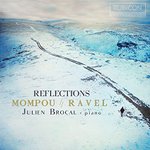|
Back
05/24/2018
“Reflections”
Federico Mompou: Paisajes – Charmes
Maurice Ravel: Miroirs, M.43 – Sonatine, M.40
Julien Brocal: Nature morte
Julien Brocal (piano)
Recording: Tippet Rise Art Center, Montana, USA (June 2017) – 71’25
Rubicon Classics RCD1008 – Booklet in English, French and German (Distributed by PIAS)

   
Fueling of the senses can be an intoxicating event, especially when so potent are their quotients that the derivative drives the listener into an outer galaxy. Julien Brocal finesses the keyboard so that the works’ contrasting assets can meld into a spherical tangency. Rubicon Classics’ “Reflections” is an insatiable odyssey, momentous upon its conclusion while lifting a curtain to new relevancy with each playback. This CD magnetizes.
A pipeline to solvency is made all the more virtual with inclusions of two vastly different composers, Federico Mompou and Maurice Ravel. “Reflections” is like a mathematical formula, equally quartered and keenly bobbing between two composers. The judicious metering helps draw clearer outlines in style while the listener comfortably saddles inside a bulb of euphoria.
The synergistic pathway, staged at the Tippet Rise Art Center, spotlights Julien Brocal’s mastering of the shallow key dipped Istomin-Horowitz CD-18 Steinway, bristling amongst Montana’s chiseled boldness like the austerity of East Jesus’ surrealistic art dwelling sifting upon the Sonoran Desert.
Mompou and Ravel travel light years apart and within their own Aurora Borealis. Mompou treads somberly with determined pensiveness, and he bleeds between land and sky in Spanish reverie. Because his mother’s family owned a bell foundry and his grandfather was a bell maker, this explains Mompou’s favored use of the ostinato inside several of the compositions.
M. Brocal’s intelligent foundation energizes the tangibility of Paisajes: the “El Lago” is painted with left-handed arpeggios on the front and back cover with a mysteriously dreamy middle; images of Satie’s Gymnopédie surfaces with use of unpretentious variations while a distillate of Debussy dissonance mimics testy horns buried inside the “Carros de Galicia.”
On another plane, Mompou moves the brain to intangible perspectives, thereby filtering his own conveyances inside the Charmes. This is a mission for the soul in a thirst to comprehend what pervades: suffering, love, penetration. One of the most evocative cases of punctuation can be heard in the fleeting “pour appeler la jolie” with its rather modernist Keith Jarrett accentuations.
Maurice Ravel, on the other hand, dabbles with a more heightened and daring pictorial poignancy. We find his cloth aflush with shimmering qualifications, especially when reaching deep inside his Miroirs. “Oiseaux tristes” unveils a Julien Brocal swift in the reaction, deep in the reach and gallant in creativity as he fully realizes Ravel’s potential.
Julien Brocal, the composer, reaches us on his own terms upon the conclusive Nature morte. This shows a man contemplating life on a canvas, bathed in severe solitude.
Christie Grimstad
|